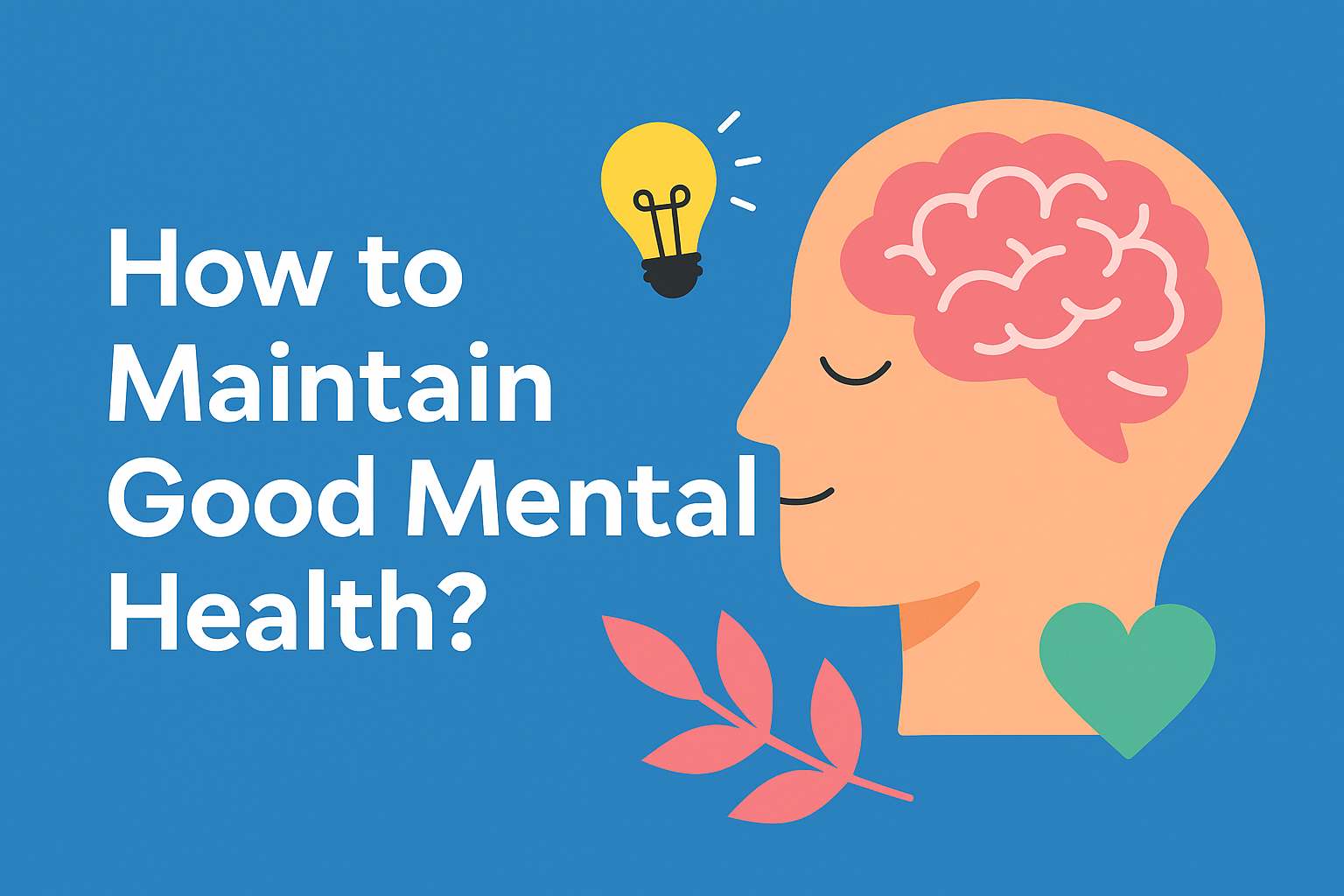Good mental health means feeling calm, balanced, and ready to deal with life’s ups and downs.
In today’s busy life, we often forget that our minds need care just like our bodies do.
This guide will show you simple and helpful ways to stay mentally strong, feel positive, and manage your emotions. It’s written for real people facing everyday problems.
Whether you’re feeling stressed, sad, or just want to feel better and happier, these tips can help you take control of your mental health.
Key Takeaways
- Take care of your thoughts, emotions, and habits daily.
- Build routines that support rest, connection, and purpose.
- Don’t wait for a crisis; mental health needs daily check-ins.
- Talk, move, sleep, and eat well; they all affect your mind.
- Everyone can improve their mental health with small steps.
How to Maintain a Good Mental Health?
Good mental health means you can think clearly, manage your emotions, and handle stress without feeling overwhelmed. It doesn’t mean you’re always happy. Instead, it means you’re able to cope with the challenges life throws at you, bounce back from tough times, and still enjoy the good moments.
Mental health awareness is important because many people don’t realize how much their mental well-being affects their daily life. Taking care of your mind should be as normal as going to the doctor for a physical checkup.
Also Check: When Do You Need Anger Management Classes?
Why Is Mental Health Important?
Many people ask, “Why is mental health important?” The answer is simple: it affects everything you do. Your relationships, work, and physical health all depend on how well your mind is functioning. Poor mental health can lead to:
- Low energy and tiredness
- Trouble focusing or remembering things
- Constant worry or sadness
- Difficulty sleeping
- Physical symptoms like headaches or body pain
When your mental health is strong, you feel more motivated, relaxed, and ready to enjoy life. You make better decisions, connect better with others, and handle stress without falling apart.
Who Needs to Work on Their Mental Health?
The truth is, everyone does. Mental health isn’t just for people with depression or anxiety. It’s for students under pressure, parents raising kids, professionals dealing with burnout, and even happy people who want to stay balanced.
Here are a few mental health examples of daily stress:
- A student feeling overwhelmed by exams
- A working mom trying to juggle a job and parenting
- A teenager feels lonely after moving to a new city
- A retiree who misses daily social interaction
All of these situations impact mental health, and all of them deserve care and attention.
Early Signs of Poor Mental Health
Just like your body shows signs when something is wrong, your mind does too. Look out for:
- Changes in eating or sleeping habits
- Feeling more tired than usual
- Lack of motivation
- Irritability or mood swings
- Avoiding friends or family
- Feeling hopeless or empty
If you relate to these, consider taking a mental health test or talking to a counselor. These tests can help you understand how you’re feeling and what steps to take next.
Daily Habits That Help Your Mind Stay Strong
How to Handle Stress?
Life is full of stress. But you don’t have to let it control you. Here are easy ways to feel calmer:
- Take slow, deep breaths when you feel tense
- Get outside and enjoy some fresh air or sunshine
- Listen to music that soothes or energizes you
- Write down your thoughts to understand your feelings better
- Try stretching or yoga to release tension from your body
These calming activities are like a reset button for your brain. Do them regularly, not just when you feel overwhelmed.
Here’s a simple quote to remember:
“You don’t have to control your thoughts. You just have to stop letting them control you.” — Dan Millman
How to Build Strong and Healthy Relationships
Good relationships are like vitamins for your mind. They help you feel loved, heard, and supported. Here’s how to build them:
- Be honest about how you’re feeling
- Listen when others talk, listen
- Respect boundaries and say no when needed
- Spend quality time with people who lift you up
- Avoid those who bring constant drama or negativity
Healthy relationships reduce stress and boost your sense of safety and belonging.
When to Ask for Help
It’s brave to ask for help when you’re struggling. You can talk to:
- A close friend or family member
- A school counselor or work mentor
- A trained therapist or psychologist
Don’t wait until things get worse. If you’re thinking about self-harm, feeling hopeless, or stuck in sadness, reach out. Support is available, and it works.
Using Technology the Right Way
Phones and apps can help or hurt your mental health. It depends on how you use them. Here’s how to use tech wisely:
- Try guided meditation or mood tracking apps
- Watch motivational videos or read mental health quotes that inspire you
- Take breaks from social media if you feel drained
- Set a timer for scrolling so it doesn’t take over your day
Tech is a tool; use it to lift yourself up, not wear yourself down.
Make Your Own Mental Wellness Plan
Create a simple plan that fits your life. It could look like this:
- Morning: Wake up, drink water, stretch for 5 minutes
- Daytime: Take deep breaths, talk to a friend, eat a nourishing lunch
- Evening: Reflect on what went well, journal for 10 minutes, and sleep by 10 PM
If you’re sharing this in a class or workshop, turn it into a short mental health PPT to help others understand and follow it too.
Final Thoughts
Taking care of your mind is one of the best things you can do for yourself. Good mental health doesn’t mean life is perfect it means you’re learning how to face challenges with strength and keep your peace through it all.
You don’t need to be an expert to start; just take one small step every day. Whether it’s reaching out, going for a walk, or saying no to things that drain you, it all counts.

